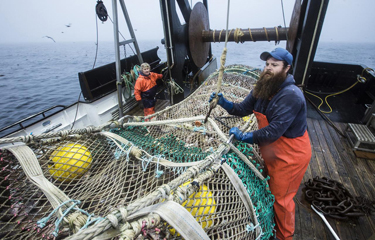Senior officials from NOAA Fisheries speaking at the Seafood Expo North America Reconnect event on Thursday, 18 March, said U.S. President Joe Biden’s emphasis on action on climate change could align well with support for the domestic seafood industry.
The new administration has not even been in office for two month and still have several political appointments waiting to be confirmed. However, NOAA Fisheries Acting Assistant Administrator Paul Doremus told the audience numerous synergies exist between the fishing industry and climate interests in Biden’s “building back better” resiliency plan.
Doremus, who took over as the acting head of NOAA Fisheries in January, said seafood’s attributes as a nutritional form of protein and of generally having a low carbon footprint make it appealing as an option for Biden’s promotion of sustainable industries.
“There's a really big place for seafood in the climate resilient food future that we're looking for,” Doremus said. “That resilience extends to our entire food system, and a stronger place of seafood in that world will have a big impact on our overall climate resilience.”
Doremus said the Biden administration wants to have the commercial fishing industry engaged in talks about developing offshore wind, which the Biden administration is promoting as part of its plan to build a zero-carbon energy system.
Doremus also talked about how the industry weathered the COVID-19 pandemic in the past year. He said both NOAA and the industry learned from the pandemic, noting specific weaknesses in the seafood supply chain, with a shortage of cold storage units noted.
“Folks had to modernize in a hurry,” he said. “We needed to figure out how to shift product forms, change our processing and distribution systems, [and] open up new channels to consumers,” he said. “ So, these are all very positive developments, but a more resilient sector in the future would have greater diversity, shorter, more local supply chain, greater processing capacity – in the United States in particular – and more modernized processing and distribution channels.”
NOAA Fisheries has already produced a pair of reports on the impact the COVID-19 pandemic has had on the fishing industry, and Doremus said another update will be issued in the early spring.
Alexa Cole, director of NOAA Fisheries Office of International Affairs and Seafood Inspection, described how the agency is working to combat illegal, unreported, and unregulated fishing and the threat it poses to domestic fishermens’ livelihoods. She said the agency and Biden administration are working with trade partners to hold bilateral and multilateral talks on the issue. The agency is also looking at developing predictive analytics that can identify potential indicators of IUU seafood products coming into the country, according to Cole.
However, Cole said that there are no plans to expand the Seafood Import Monitoring Program at this time to include additional species aside from the 13 already covered.
“We're really focused on the effective implementation of the program as it exists right now,” Cole said.
Photo courtesy of John Rae/NOAA







